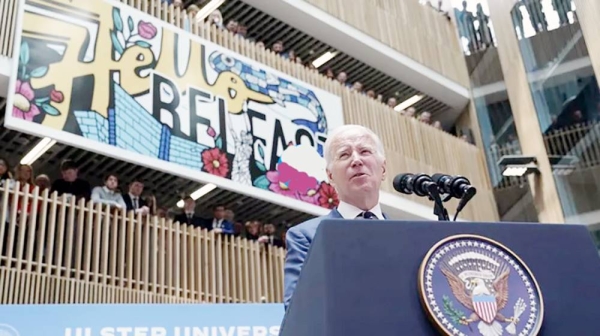
The UK is edging towards a new deal with the EU on Brexit arrangements for Northern Ireland with the potential for easing border checks on certain goods.
Officials in London and Brussels have been involved in intense “technical talks” in the past two weeks over the future checks on food, plants and parcels going from Great Britain to Northern Ireland.
Downing Street’s official spokesman said the discussions had been constructive but that there were “still significant differences that need to be resolved”. The cabinet minister David Frost spoke by phone to the European commission vice-president Maroš Šefčovič on Friday.
Sources said that while progress has been made on Northern Ireland, efforts did not involve removing checks on goods but instead were being concentrated on removing the series of “rolling deadlines” from the implementation of border controls.
One option is a new series of agreed milestones to be achieved involving agreement with business and civic society before each stage of the protocol is implemented. It would mirror public health experts’ “data not dates” advice to Boris Johnson regarding the easing of lockdown in England.
The talks began a fortnight ago after relations with the EU reached a low point, with Brussels launching legal action against the UK for taking a unilateral decision to extend the grace period for checks on supermarket goods going from Great Britain to Northern Ireland.
A cabinet source played down the row, claiming the dispute was a result of an unfortunate “mismatch in the communications last month”. This reflects revived urgent efforts to sort out the situation and a recognition in London that a joint approach is the way forward.
This is a change in policy from February when Michael Gove demanded the protocol be delayed until 2023.
Last week the Northern Ireland secretary, Brandon Lewis, told political parties in Belfast that the protocol would not be scrapped, despite demands by the Democratic Unionist party and others, and seven consecutive nights of violence in Northern Ireland.
There is urgent political need to calm the atmosphere in Northern Ireland but there is also recognition in London, Dublin and Brussels that any deal centring on the protocol will not address loyalist protests. Brexit checks down the Irish Sea have enraged loyalist communities who see the trade border as an assault on Northern Ireland’s place in the union of the UK.
EU sources have put it to UK officials that 90% of border checks could disappear if Britain agreed to align food standards with those of the bloc.
Ireland’s Europe minister, Thomas Byrne, told the BBC the situation was “delicate” but he said it would be “excellent” if a veterinary deal could be achieved as it would solve problems both in Northern Ireland and those facing food exporters in Great Britain.
But many see such a food agreement as unlikely because entering into such as deal would represent a complete U-turn for the UK, which opposed regulatory alignment to achieve a hard Brexit.
There have been suggestions that the border checks could be significantly eased if the UK adopted an agreement along the lines of that operating for Australia and New Zealand agrifood trade. However, industry insiders say this would not address loyalist concerns as it still requires paperwork.
The agrifood sector is instead urging the EU and UK to take a pragmatic approach by extending the categories of goods deemed not at risk of crossing into the Republic of Ireland to include food.
The current talks are focusing on a new implementation programme outlined in a plan delivered by London to Brussels a fortnight ago. The EU has also requested real-time access to customs and border check data in Belfast ports.












